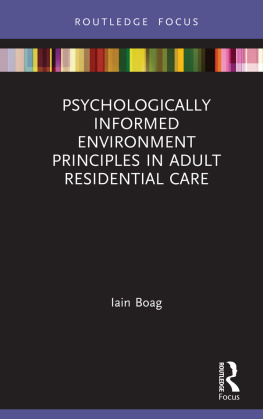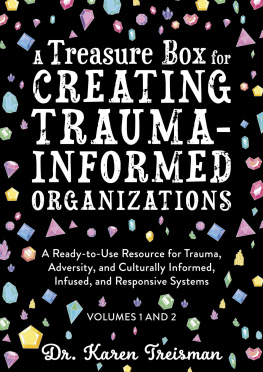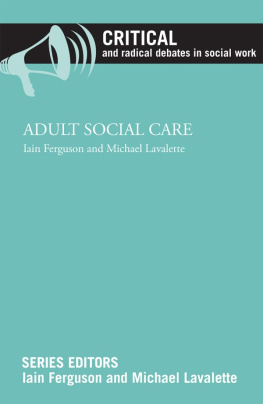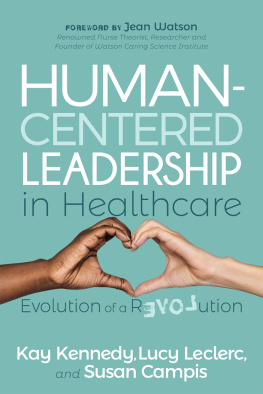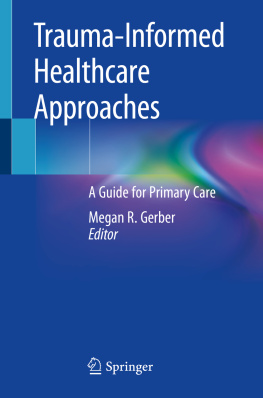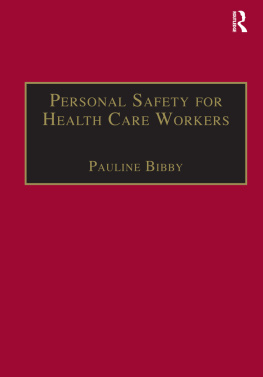Psychologically Informed Environment Principles in Adult Residential Care
As pressure grows on care managers and staff to work with ever more complex needs, this book is a timely account of how introducing the Psychologically Informed Environment (PIE) principles into a care home will improve work practice and outcomes for residents.
The PIE approach enables staff to:
- Have improved understanding of residents needs
- Better understand how to respond effectively to complex behaviour
- Introduce trauma-informed practice into their work
- Improve staff support and morale
- Improve outcomes for even the most hard-to-reach clients
Reflecting on one care homes journey to becoming a PIE this book shows how low-cost, high-impact interventions delivered on the frontline can have far-reaching effects on the wellbeing of residents, staff, and the wider culture of the care environment. It will be of interest to all professional, academics, policy-makers, and students working in the fields of adult social services and health and social care more broadly.
Iain Boag has worked in the homeless and residential care sectors since 2001, and is Head of Residential Care Services at St Martins in Norwich. Almost 20 years experience of working on the frontline of homeless and care services has given him invaluable insight into the challenges that homelessness, substance misuse, and poor mental health bring, and of how best to support people with complex needs. Specialising in working with dual diagnosis, Iain is committed to improving outcomes for the most marginalised and hard to reach. Iain lives in Norwich with his wife and two children.
The implementation of the Psychologically Informed Environment (PIE) makes a real difference to some of the most vulnerable and traumatised people in society. This book provides an excellent introduction to the implementation of PIE in an adult residential care setting and gives real examples of how to turn theory into practice.
Dr Jan Sheldon, Chief Executive, St Martins
First published 2020
by Routledge
2 Park Square, Milton Park, Abingdon, Oxon OX14 4RN
and by Routledge
52 Vanderbilt Avenue, New York, NY 10017
Routledge is an imprint of the Taylor & Francis Group, an informa business
2020 Iain Boag
The right of Iain Boag to be identified as author of this work has been asserted by him in accordance with sections 77 and 78 of the Copyright, Designs and Patents Act 1988.
All rights reserved. No part of this book may be reprinted or reproduced or utilised in any form or by any electronic, mechanical, or other means, now known or hereafter invented, including photocopying and recording, or in any information storage or retrieval system, without permission in writing from the publishers.
Trademark notice: Product or corporate names may be trademarks or registered trademarks, and are used only for identification and explanation without intent to infringe.
British Library Cataloguing-in-Publication Data
A catalogue record for this book is available from the British Library
Library of Congress Cataloging-in-Publication Data
A catalog record for this book has been requested
ISBN: 978-0-367-43647-6 (hbk)
ISBN: 978-1-003-00508-7 (ebk)
Typeset in Times New Roman
by Apex CoVantage, LLC
This book is dedicated to all our residents, past and present, who have let us share their lives.
Firstly, I would like to thank the residents of Highwater House who have shared so many stories. I am struck time and again by their resilience in the face of great hardship, and their hope in the face of suffering. It is a pleasure to have worked with so many vibrant, unpredictable and expressive people over the years.
A huge thanks go to Angela and the team at Highwater without whom this book could never have been written. A sentence cannot express the appreciation I feel for the years of support, conversation, argument, and encouragement I have had throughout my career. It is only through their dedication and enthusiasm for their work that the PIE principles have gained such traction in the home. Truly the team represents the best of what it means to care.
Thanks too to Jan and the wider St Martins family for allowing me to draw so heavily from our daily work.
Finally, my greatest thanks go to my family. To my wife, Hannah, whose support, counsel, and straight-talking have guided my life and work for so many years, and whose untiring editing has made this book possible. And to our children, Ella and Tom, thanks for listening to my never-ending musings round the dinner table.
A special mention also goes to Judy, who, when we were chatting about Psychologically Informed Environments, asked Why dont you write a book?
This book introduces the Psychologically Informed Environment (PIE) principles, an innovative framework which care workers can use to improve support and outcomes for residential care service users, particularly those with complex needs.
It is, in principle, an exploration of one residential care homes journey as it becomes a Psychologically Informed Environment. Drawing from trauma-informed practice and using case studies from the home, we will explore the PIE model as a psychosocial intervention which places the service users experiences and emotions at the heart of the care package; and as a framework that emphasises focus on person-centred care.
At Highwater House, we have found that using the PIE principles has had great effect within the home, impacting positively on staff and resident relationships and the day-to-day running of the service; and it has helped to provide a clear and purposeful narrative for the service. The PIE framework helped us to achieve an overall outstanding rating at our last Care Quality Commission (CQC) inspection. The report says:
A healthcare professional commented that the staff at Highwater House developed strong, trusting relationships with people using the service. The service promoted a kind, caring and empathetic culture using a new initiative Psychological Informed Environment (PIE) approach. This approach aims to reduce social exclusion and improve the mental health of homeless people. It also aims to improve staff morale and encourage positive interaction. PIE puts the relationships staff develop with people at the very heart of the care process.
The report also highlights some of the statistics which help to prove the models efficacy, saying:
Since using the PIE approach, the number of call-outs to the police reduced from 14 in a year to two and untoward incidents reduced from 53 to 20.
The statistics we have gathered over the last three years show a marked decline in the use of emergency services, untoward incidents, and uses of time-outs in the home. Throughout the book you will be introduced, via case studies, to creative approaches we have used when working with challenging residents which have improved outcomes. Using creative behavioural management techniques, or elastic tolerance, has helped staff to become increasingly versatile in their work with residents with complex needs.
In 2019 the home won a Homeless Link award for Excellence in Supporting People for its use of the PIE principles; we recently also won the Great British Care Awards regional award for team work. These were unexpected, yet welcome, confirmations of our good work.
Working with a dual diagnosis client group, Highwater House is a relatively unique residential care home. Yet, as pressure grows on the health and social care industry to find creative, cost-effective, ways to work with vulnerable adults, care homes will be expected to accept referrals for increasingly complex individuals, or risk losing funding.

